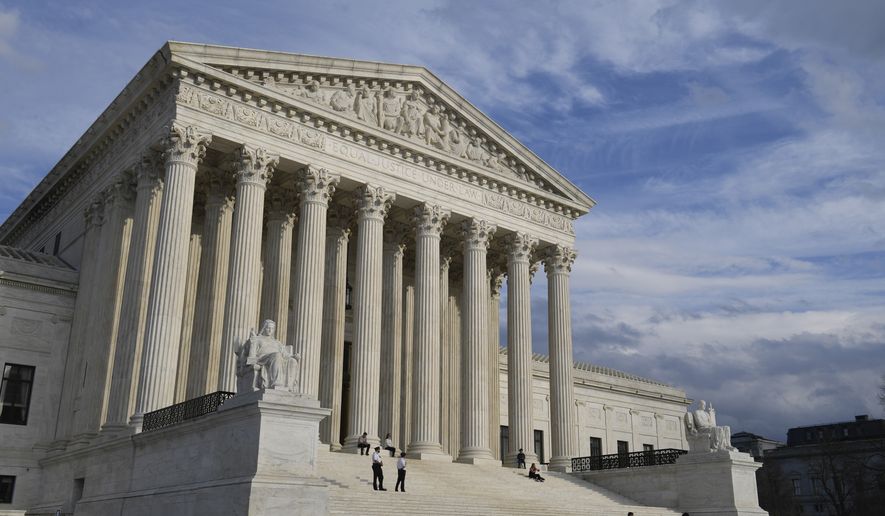OPINION:
Last week’s blockbuster Supreme Court opinion, 303 Creative v. Elenis, has unleashed a fury of criticism from those who wrongly believe that a majority of the justices have condoned discrimination against gay-identified people.
Actor Michael Imperioli – missing the point of the ruling entirely – sarcastically thanked the Supreme Court for “allowing” him to “forbid bigots and homophobes” from watching his work, adding, “hate and ignorance is not a legitimate point of view.”
Nearly all of the mainstream media’s headlines after the ruling have reinforced the Left’s false narrative. MSNBC falsely claimed that Lorie Smith – the plaintiff in the case – “doesn’t want to serve same-sex couples.” UC Davis law professor Aaron Tang wrote in The New York Times that the ruling “has opened the door to discrimination.”
But nothing could be further from the truth.
Lorie Smith and other creative artists, such as Colorado cakebaker Jack Phillips, serve all people.
Both parties in the 303 Creative case, Lorie Smith and Colorado, admit that Smith “will gladly create custom graphics and websites for gay, lesbian, or bisexual clients.”
What she will not do is create custom messages that violate her deeply held religious
convictions.
To be clear, Lorie does not single out gay-identified people and refuse to serve them, as many on the left are asserting. But she will refuse to serve any customer – straight or gay – if they request that she speak in a way that violates her faith.
That’s not discrimination. That’s discernment.
In fact, far from permitting discrimination, the U.S. Supreme Court’s ruling last week helps end it.
Government bureaucrats and socially liberal activists will now have a much tougher time discriminating against people of faith who believe that marriage is between one man and one woman.
At the heart of Lorie Smith’s victory are her foundational right to religious freedom and her ability to speak her religious convictions freely, absent government coercion.
As the court’s opinion in 303 Creative stated, “The framers designed the Free Speech Clause of the First Amendment to protect the ‘freedom to think as you will and to speak as you think.’” That’s all committed Christians like Lorie Smith are asking for.
In the Supreme Court’s 2015 ruling Obergefell v. Hodges, which mandated that states permit same-sex marriage, Chief Justice John Roberts presciently warned that the decision created an inevitable clash with religious liberty.
“Many good and decent people oppose same-sex marriage as a tenet of faith, and their freedom to exercise religion is – unlike the right imagined by the majority – actually spelled out in the Constitution,” the chief justice wrote. “Hard questions arise when people of faith exercise religion in ways that may be seen to conflict with the new right to same-sex marriage … There is little doubt that these and similar questions will soon be before this Court.”
As one of the millions of Americans who embrace religious faith, I am deeply grateful that last Friday, when it comes to protecting the freedom of speech and religious liberty, the court got the answer right.
But make no mistake: we’re witnessing an accelerating clash of two distinctly different worldviews regarding religious liberty.
On one side are those who believe government is the ultimate arbiter and authority in all spheres of life.
But those of us on the other end of the spectrum believe quite the opposite: that government’s authority is intended to be limited and that the state is, in fact, operating outside of its God-designed scope when impinging on such fundamental liberties.
The distinction reminds me of a chilling meeting I once had with the senior editor of a major newspaper. We were discussing the issue of abortion.
I asked if he would be willing to compromise a bit for the sake of the safety and security of children. The editor’s cold and heartless answer fell like a hammer blow.
“I’m sorry,” he said with a straight face. “But there will inevitably be casualties in the culture war.”
Those on the political left are fine with culture war casualties – but only if those suffering on the short end of the stick are people of faith.
In a lesser-known fact of Lorie Smith’s story, prior to placing her faith in Jesus Christ, she used to support same-sex marriage. Now, she wants to “design and create messages that celebrate God’s view for marriage.”
But because of her faith, in the wake of the lawsuit, Lorie has faced more than her share of vitriol. She has experienced death threats, menacing voicemails, and messages on social media threatening her with physical harm and rape.
The contempt directed at Lorie makes it clear that she’s not the one who needs to learn tolerance. On this week celebrating Independence Day, we are reminded that America was founded on the principles of free speech and religious liberty. It was in the quest of religious freedom that the Pilgrims on the Mayflower emigrated to the New World.
In concluding his opinion in 303 Creative, Justice Gorsuch opined, “Tolerance, not coercion, is our Nation’s answer.
“The First Amendment envisions the United States as a rich and complex place where all persons are free to think and speak as they wish, not as the government demands.”
And it’s this quest for true tolerance and freedom that we are still seeking to fulfill today.
Jim Daly is president of Focus on the Family, a global Christian ministry dedicated to helping families thrive, and also the host of its award-winning daily radio broadcast, which has been inducted into the national Radio Hall of Fame.




Please read our comment policy before commenting.